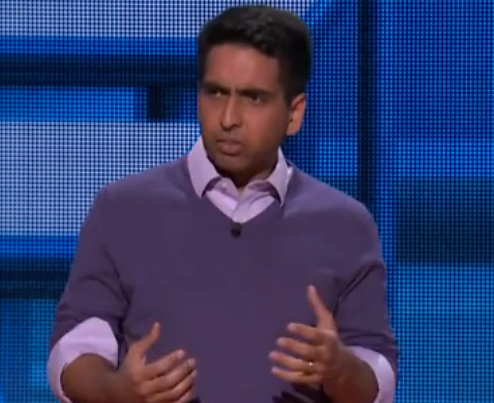So the idea of mastery learning is to do the exact opposite.
然而掌握式教育的观念就是反其道而行之。
Instead of artificially constraining, fixing when and how long you work on something,
将人为的限制、僵化、何时学习和学多久、
pretty much ensuring that variable outcome, the A, B, C, D, F -- do it the other way around.
把结果按A、B、C、D、F分级的行为,转换成另一种方式。
What's variable is when and how long a student actually has to work on something,
学生之间的差异应该是何时以及多久可以掌握好一门知识,
and what's fixed is that they actually master the material.
要坚持一致的是学生真的掌握了这门知识。
And it's important to realize that not only will this make the student learn their exponents better,
我们必须意识到它的重要性,这样不仅可以让学生更好地掌握指数函数,
but it'll reinforce the right mindset muscles.
同时也可以培养一种正确的思维方式。
It makes them realize that if you got 20 percent wrong on something,
这可以让他们认识到如果他们答错了20%,
it doesn't mean that you have a C branded in your DNA somehow.
不代表他们天生就只有C的水平,
It means that you should just keep working on it.
而是说明他们还需要在这个内容上继续努力、
You should have grit; you should have perseverance; you should take agency over your learning.
坚持不懈、迎难而上,拿出热情克服学习中的障碍。
Now, a lot of skeptics might say, well, hey, this is all great, philosophically,
现在,很多怀疑者可能会说,这听起来不错,理论上来说,
this whole idea of mastery-based learning and its connection to mindset, students taking agency over their learning.
这套以掌握为目的教学方式以及与思维方式的连结,可以让学生积极克服学习中的障碍。

It makes a lot of sense, but it seems impractical. To actually do it, every student would be on their own track.
这听起来很有道理,但不太实际。要实现一点,每个学生都必须遵循自己的学习进度。
It would have to be personalized, you'd have to have private tutors and worksheets for every student.
必须有个性化的教学方式,一对一辅导和有针对性的练习题。
And these aren't new ideas -- there were experiments in Winnetka, Illinois, 100 years ago,
但这并不是什么新观念,在100年前的伊利诺伊州,温内特卡市就有这样的实践:
where they did mastery-based learning and saw great results,
他们尝试了这种以掌握为目的的教学,成果很显著,
but they said it wouldn't scale because it was logistically difficult.
但是他们表示很难大面积推广,毕竟可行性太低了。
The teacher had to give different worksheets to every student, give on-demand assessments.
老师要给每个学生不同的试题,视情况打分。
But now today, it's no longer impractical. We have the tools to do it.
但如今,这已经不再是空想了。我们有了辅助工具。
Students see an explanation at their own time and pace? There's on-demand video for that.
学生可以通过看分类视频,按照自己的进度去寻找解答。
They need practice? They need feedback? There's adaptive exercises readily available for students.
他们需要练习吗?需要反馈吗?学生很容易就能进行适应性练习。



